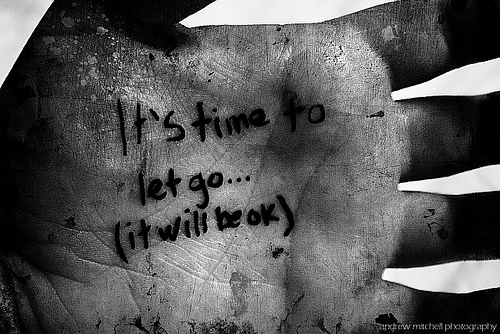A question I get asked a lot is:
In recovery for bulimia, “What happens if I still really want the eating disorder and the eating disorder behaviors?”
Many women in eating disorder recovery – even though they really want to recover – still feel as if a part of them still wants to hang on to it. This is probably why many women never get to that state of truly “recovered” or being totally free from the eating disorder symptoms. There are many women in recovery for bulimia who go through so much treatment for bulimia and get tons of eating disorder help and still never recover – because part of them still wants it, still needs it.
This is very common of women in recovery for bulimia. Many of these women (myself included way back when) whether recovering from bulimia or anorexia or EDNOS, do partially want to hang on to the eating disorder, however, this is where we need to look at the dual nature of our wants and desires. Those who still want to hang on to the eating disorder behaviors want to keep it for a reason, and one of those is comfort. It’s easy to hang on to the way things are because then you don’t have to change. Yes, of course we want full recovery for bulimia but we are comfortable where we are. The eating disorder is filling a need for us which is why we developed it. It doesn’t matter the reason or cause. Many women will go into recovery and get eating disorders help and treatment because they know they have to, not necessarily because they want to.
There’s a stigma that eating disorders are a disease that is never going to go away. I don’t find this is true. I’ve known many women who have achieved full recovery for bulimia and now lead “normal” lives. Many factors go into this but mainly I believe that if you choose to recover and are willing to do the work – whatever it takes to recover – you can have what you desire. It’s a humbling process which requires many aspects including brutal honesty, being willing to take an objective look at your life, figure out what is broken and who can fix it. The question is whether or not you are ready and whether or not you decide that full recovery for bulimia is something you want.
The question I then ask is, WHO is the one that really wants to hang on to it?
For a long time I battled myself and went through such inner conflict because I thought there was something seriously wrong with me. How could I want to separate opposite things – recovery for bulimia and the bulimia disorder at the same time? I wanted to change but it seemed so painfully hard and confusing.
The way I dealt with this was by learning to separate myself and my thoughts from the eating disorder thoughts. I stopped identifying myself with those harsh negative thoughts that were associated with the eating disorder symptoms and behaviors. I realized that it was not me – that I had my own true voice and the eating disorder voice was separate from me. Hence the dual nature of wanting the eating disorder and wanting recovery for bulimia.
It was ME who wanted full recovery for bulimia!
It was the eating disorder thoughts that I allowed to take over my mind and gave in to when I had the binge and purge behaviors. I became aware of my thinking and started to hear all of the negative eating disorder thoughts that it was “telling” me. Mia, as I called my eating disorder, was the one who wanted me to engage in the eating disorder behaviors. She’s the one who told me I was fat, I didn’t deserve to live, I didn’t deserve to be happy, and that I was nothing. She’s the one who didn’t want me to get eating disorder help and screamed out in agony when I got treatment for bulimia. Now its not to say that I was hearing voices, but when I became aware of Mia’s “mind chatter,” I realized all of the dysfunctional eating disorder thoughts I was having.
So how did I deal with wanting both recovery for bulimia and the bulimia disorder at the same time?
By learning how to distinguish my own thoughts separate from the eating disorder thoughts.
I learned that I had a choice in my recovery for bulimia. I could choose whether or not I wanted to listen to the eating disorder thoughts.
I did this by…
- Journaling
- Having a dialog with the eating disorder voice
- Keeping a food and feelings journal at mealtime
- Meditation
- Talk therapy
- Rallying with my support people!
So what happens if I still really want the eating disorder and the eating disorder behaviors?
Hang in there. Keep working your recovery for bulimia and don’t give up. Begin to separate yourself from your eating disorder. Use the tools listed above to help guide you along your way. You are not your eating disorder. You must find your inner voice that is true and unique, that is YOU.
Recovery for bulimia is not easy, and there may be a part of you that will always want it. That is okay. It is what it is. But you can move past it, knowing that your TRUE self doesn’t want the eating disorder and you can grow past it to where you won’t need it anymore to rely on. You are not your eating disorder, but you may not know who you are either. This is normal and is all part of the recovery for bulimia process.
Start to develop your identity separate from the eating disorder voice. The eating disorder thoughts might get louder at first, but will disappear over time. Trust the process. Have faith and know that you can truly recover. Before you know it you’ll be looking back, grateful for all the blessings in your bulimia recovery.
Peace, Love + Freedom,



I’m so glad I came across this website. Crazily enough I found it when I googled ‘feeling fat’ because i’ve been struggling so much lately and I just didn’t know what to do. Turns out this was exactly what I was looking for without realising it. I’ve been dealing with anorexia for nearly half my life now (I’m 20) and although I’ve maintained a healthy weight for some time I’ve never fully been able to get rid of ED voice. I have spent so many years hating myself and believing that I will always have to deal with this voice but now I realise that in some part I am also holding onto it, and I’m just not sure how to go about taking the next step. Reading the articles on this site has made me see that there is hope and that one day, if I work at it, hopefully I will be in a place similar to you where things are much brighter. Thankyou so much for this blog, you’ve helped me more than you could know 🙂
xx Sarah